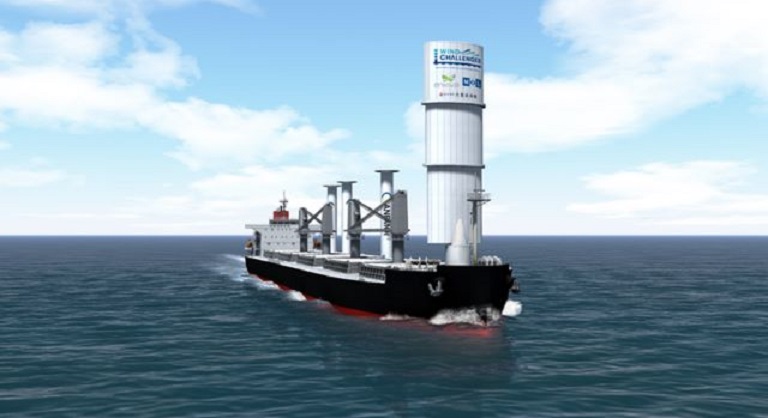Enviva Inc. (NYSE: EVA), the world’s leading producer of sustainable wood bioenergy, and MOL Drybulk Ltd. (MOLDB), a subsidiary of Mitsui O.S.K. Lines Ltd. (MOL), a leading global marine transport group, announced they have signed an additional memorandum of understanding agreement to deploy an environmentally friendly bulk carrier (EFBC) to reduce the greenhouse gas (“GHG”) emissions in the ocean transportation of sustainable wood pellets and biofuels.

Following a successful joint study phase, the EFBC is scheduled for launch in 2024 and will aim to utilise rotor sail technology developed by Anemoi Marine Technologies Ltd together with MOL’s ‘Wind Challenger’ technology, which would both reduce emissions by harnessing wind energy, for an expected average GHG savings of about 20 percent in total. The 62,900-deadweight tonnage (dwt) vessel will be built by Oshima Shipbuilding.
Sustainably sourced wood pellets, like the ones Enviva produces, are considered carbon-neutral even after taking into account the full supply chain, and have been proven to reduce greenhouse gas emissions by up to 85 percent compared to coal. As part of Enviva’s goal to achieve net-zero greenhouse gas emissions from its operations by 2030, the company has committed to addressing scope 3 emissions by proactively engaging with partners like MOLDB to develop and implement new clean energy solutions. As shipping pellets across the Atlantic Ocean currently comprises one third of Enviva’s supply chain emissions, this partnership will generate a large carbon savings in its upstream and downstream value chain.
“Reducing greenhouse gas emissions in our supply chain is a foremost priority for us,” said Thomas Meth, Chief Commercial Officer of Enviva. “While we have made progress in reducing our operations’ CO2 footprint, there are more innovative opportunities like the one we are partnering on with MOLDB to continue to strive for more circular approaches in our supply chain. We couldn’t be more excited about continuing to build on our relationship with MOLDB to help reach our goals of achieving net-zero greenhouse gas emissions by 2030.”
Kazuhiko Kikuchi, President and Representative Director of MOLDB said, “We are very happy to make this announcement today alongside our long-term partner, Enviva. Their support and commitment to this project is invaluable. The purpose of launching MOLDB is to become a team of professionals in the dry bulk business, work closely with our customers to meet their needs and provide solutions. The EFBC is a great example, and we cannot wait to see this truly unique vessel set her sails and catch the wind.”
Plans to develop the Wind Challenger started in 2009 as an industry-academia joint research project led by the University of Tokyo. MOL took charge of the plan in 2018 and has been working on the technology since. The first Wind Challenger is scheduled to be released in the second half of this year. The system converts wind energy to propulsive force with a telescopic hard sail. The long-term goal is to develop a widely accepted shipping solution to achieve the International Maritime Organization target in combination with other measures to reduce GHG by equipping vessels with multiple sails.